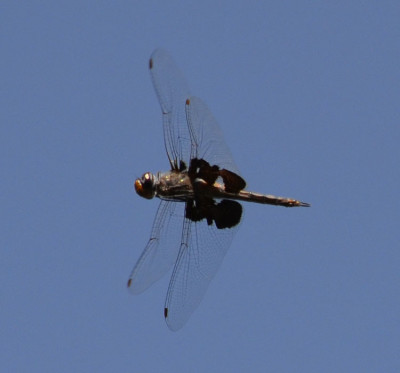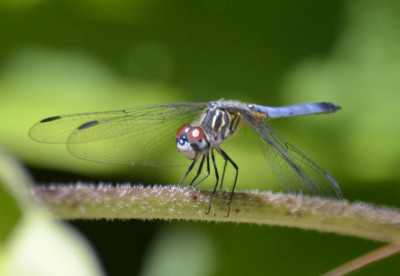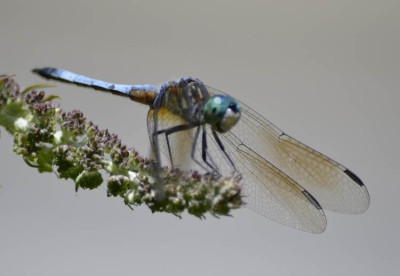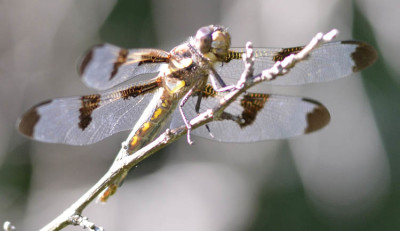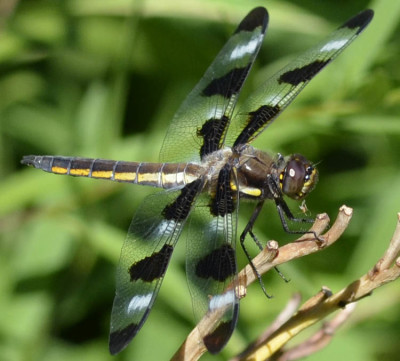I’ve always known we had some dragons living in and around our back yard each summer. Dragonflies are very quick and alert. They use those huge eyes to watch for danger and will usually lift off from a perch if you get too close. In 2013, armed with my camera, I decided to try harder to see who was visiting.
What Kind of Dragonflies Do We Have?
In July several times in mid-morning I noticed some very large dragonflies patrolling about 10-15 feet off the ground. They didn’t stop to perch which made taking a photo much more challenging.
Eventually on July 25, I decided to manually focus the camera at about the range I thought they were flying at and wait till one zipped across the viewfinder. Then click.
The results, not surprisingly, were mostly out of focus. But this one shot made it all worthwhile:
I had been suspicious of the apparent big black wing blotch and here was the confirmation I needed. This dragonfly, and at least one of the others that I saw clearly, was a Black Saddlebags.
The book Stokes Beginner’s Guide to Dragonflies was invaluable for identifying these guys. I recommend it.
Searching for a Ruby Red Perched Dragonfly Finds Everything But
While pulling weeds on July 24, I flushed a small bright red dragonfly twice. Putting work before pleasure (always a bad idea) I didn’t immediately get my camera. A few hours later I went out in search of it with no luck!
Fortunately, I did find two different dragonflies. These ones are more challenging for me to identify.
I think this one is a female or immature male Blue Dasher. It’s most like the immature male.
This one is likely a male Blue Dasher.
No Blue Dashers are red, so that means I saw at least 2 kinds of dragonflies that day.
A Slower Start on a Cool Morning Permits Some Closer Looks at Dragonflies
On July 28 the weather was cool first thing (okay about 8 a.m.!) in the morning. That meant most of the insects were not yet stirring. Two dragonflies took advantage of this lull and perched in the sun, warming up and watching while they waited.
This first one is either a female or a juvenile 12 Spotted Skimmer. I suspect it is a female but I didn’t catch it to check the details. (Whenever possible I don’t interfere with my subjects. This dragonfly, for instance, needed to rest and warm up. If I startled it or captured it I would cause it to waste precious energy for no worthwhile reason.)
A few yards away a male 12 Spotted Skimmer was also sunbathing. Its colours were very vivid and crisp. According to the Stokes Guide, the white spots develop after the male matures so the vividness did not mean the dragonfly had just emerged from its nymph.
A Reminder Not to Prune Away All the Perches
If you notice both dragonflies are perched on bare dead stems. One female is on a tree branch; the male on a dried out day lily stalk. It’s a good idea not to prune too rigorously or you may eliminate both birds’ and insects’ favourite perches.
Our Yard is a Dragon Safe Environment
Part of the reason that I think our yard is popular with these aerial predators is that we don’t spray anything. We don’t use fertilizer or weed killer on our lawn. We don’t use pesticides on our plants. So the place is seething with insects. A veritable buffet for dragonflies and it’s all safe to eat!
You Don’t Need a Pond or Stream to Host Dragonflies
For those of you who think I live near a pond, stream or lake, I would like to clarify that I don’t. There is a small stream about a kilometre away. My dragonflies, however, could have come much further than that. These types are all known to move around while they are hunting.
Related Reading
- What Blue Bird is Singing from that Tree Top in Southern Ontario?
- The Damsels and Dragons are Dancing
Join In
Have you snapped a dragonfly on the wing? Do dragonflies visit your yard and help control those pesky mosquitoes? Please share your experiences with a comment.

